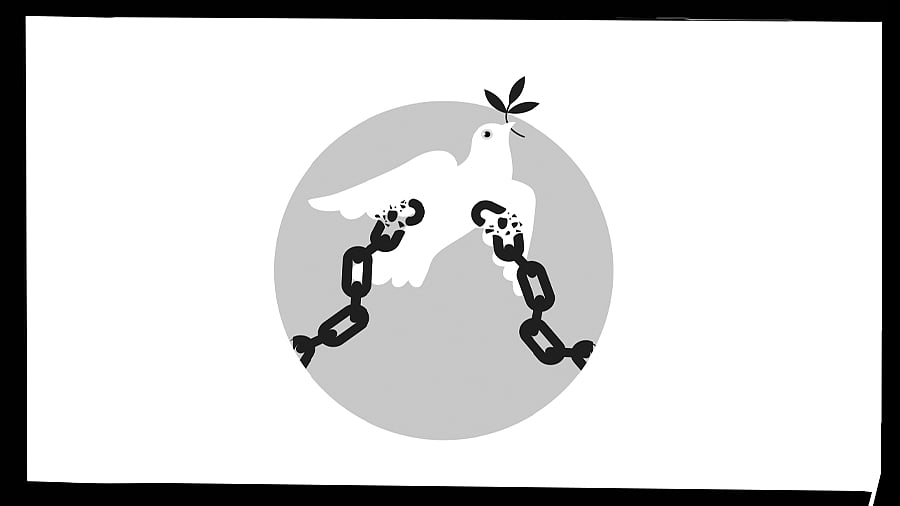
Jaish-e-Mohammad chief Masood Azhar’s recent public speech in Bawalpur, promising a resurgence in terror targeting India and Israel exposed another Pakistan lie. It is hardly surprising that regular news of terrorist attacks in Pakistan does not evoke much sympathy in India primarily because of the 1,608 J&K Police, 511 CRPF officers and thousands of other soldiers and civilians murdered by Pakistan’s terror factory in Kashmir since 1989.
Pakistan must remember every terror factory eventually turns on its creators: Osama bin Laden was assassinated 54 kilometres from the J&K Police post in Teethwal, 12 years after he attacked America and 27 years after he partnered with America to fight the USSR in Afghanistan. Pakistan’s healing lies in shutting down their terror factory, confining the garrison state to barracks and embracing real democracy.
Pakistan has no legitimate claims on Kashmir any more than it has on Hyderabad or Bhopal. But the Valley became the vessel for Pakistan’s anger at itself after the idea of Pakistan died at birth when most Muslims stayed back in India. And it was buried with the creation of Bangladesh.
Pakistan’s terror factory was born at a meeting in 1980 between General Zia-ul-Haq and Jamait-i-Islami’s (JEI) Maulana Abdul Bari in Rawalpindi. JEI was founded in 1941 by Maulana Syed Maududi, whose 1920s book ‘Jihad in Islam’ advocated for an Islamic state and detailed the revolutionary tactics that became terrorism.
General Zia responded to Maulana Bari’s hesitations by saying, “How can the Americans stop us from waging jihad in Kashmir when they are waging jihad in Afghanistan?”. Zia suggested he would overinflate the Afghanistan war costs - reimbursed by the CIA and Saudis - for diversion to Kashmir. Since that bargain, Pakistan has exported over 1 lakh handguns/AK-47s and hurt over 75,00 families in J&K.
Terrorism ignores the fundamental law of war by removing the distinction between combatants and noncombatants. Terrorists who kill innocents find it hard to thrive in democracies because their totalitarian mindset recognises no limits to power.
America believes terrorism began with the 9/11 attacks but ‘The Meadow: Kashmir, Where the Terror Began’ by Adrian Levy and Cathy Scott-Clark suggests that the kidnapping of six westerners in 1995 kicked off Islamic terrorism, expanding beyond India.
It believes the early terrorist career of Masood Azhar mirrored Osama bin Laden’s and suggests, “In the mountains of Kashmir that summer, Masood’s gunmen experimented with the tactics and rhetoric of Islamic terror, unveiling to the world extreme acts and justifications that were new but would soon become all too familiar.”
In 2002, Masood’s bodyguard adopted tactics honed in the kidnapping to abduct Wall Street Journal reporter Daniel Pearl and film his horrific beheading. The attacks in New Delhi, Srinagar, New York, Washington, London and Mumbai were connected. Terrorism knows no boundaries and rotates enemies.
The practical Sufi sect Ahle-et-Quad in Kashmir keeps the Valley dotted with ziarats, shrines and relics that are considered sacrilege by Wahabis. The roots of this moderation go back centuries - Rajtarangini, Nooruddin Noorani, Lal Ded, and Habba Khatun.
Kashmir’s tangling with Pakistan has three roots: first was Maharaja Hari Singh’s dithering on accession; second was India’s mistake of involving the UN in 1948 that made Kashmir a pawn in a bigger Cold War chess game (thirteen UN resolutions on Kashmir supported Pakistan — the last one in 1957 — and India is grateful to the USSR for their consistent veto).
Third, Article 370 enabled local politicians to use soft separatism as a profitable political strategy while making an “elite bargain” that closed its society and economy.
In 1937, American political scientist Harold Lasswell proposed the term ‘garrison state’ for specialists in violence who create threats to establish the supremacy of the military over the state and society.
Pakistan’s garrison state is incompetent, losing all the wars it has fought with India. But it draws power from its guns and partnership with religion. Military propaganda about a conspiracy by Hanud-Yahud-Ansara (Hindus, Jews and Christians) to end Pakistan has ‘truthiness’ because of the myth about eternal conflict between Dar-ul-Islam (house of Islam) and Dar-ul-Harb (house of infidels).
But India has more Muslims than Pakistan and J&K has the religious diversity of Jammu and Ladakh. General Pervez Musharraf calling Pakistan ‘Islam ka qila hai’ (Pakistan is the fortress of Islam) was self-interest masquerading as national interest. But weak consequences for Pakistan for its attack on J&K’s Assembly in 2001 led to bolder attacks on Indian Parliament and Mumbai.
Prospects for peace (Aman ki Alamat) in Kashmir have improved because of cross-border army and airforce strikes. Nobel laureate Thomas Schelling’s framing of deterrence as the promise of future pain.
The probability of peace has also improved because of the abrogation of Article 370, Pakistan’s weakness, India’s strength and the global recognition of radical Islam as problematic.
In 1995, American security officials — in Srinagar to track their citizens kidnapped by Pakistani-trained Al Faran terrorists — dismissed one of us relaying intelligence from captured terrorists about an attack being planned on them at home with “don’t internationalise an India-Pakistan dispute and speculate about impossibilities”.
Poet Muzzafar Razmi’s lament yeh waqt bhi dekha hai tareekh ke safahon ne, lamhon ne khata ki thi sadiyon ne saza payee (history has witnessed many tragedies when mistakes made in moments bring suffering for years) feels like it was written for Pakistan.
Their terror factory that imposed pain, tears and blood in Kashmir is now reversing its gaze and turning on its creator. Pakistan has the power to end this khata (mistake) by disbanding the ISI, creating political and bureaucratic supervision of the military and making peace with India.
As the Kashmiri proverb advises, “poetim mashravv, bronh kun nazzar thaav” (Forget the past; look to the future).
(The writers are former Director General of J&K Police and CRPF and a J&K born entrepreneur. Their recent book is Kashmir Under 370)